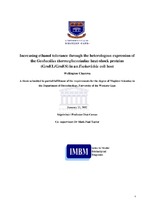| dc.contributor.advisor | Cowan, Don | |
| dc.contributor.advisor | Taylor, Mark Paul | |
| dc.contributor.author | Charewa, Wellington | |
| dc.date.accessioned | 2016-11-22T13:27:28Z | |
| dc.date.available | 2016-11-22T13:27:28Z | |
| dc.date.issued | 2012 | |
| dc.identifier.uri | http://hdl.handle.net/11394/5325 | |
| dc.description | >Magister Scientiae - MSc | en_US |
| dc.description.abstract | Due to economic and environmental concerns associated with use of fossil fuels, humanity is seeking alternative fuels. Ethanol is one of the alternative fuels produced commercially. Current ethanol production technologies using first generation ethanol processes is criticised for depleting the food supply and escalating food prices. Biomass is a target feedstock for use in bioethanol production and would resolve the criticism associated with the current bioethanol industry. Bacterial strains such as Geobacillus thermoglucosidasius NCIMB 11955 can be used to produce ethanol from biomass because they assimilate hexose and pentose sugars, a property that is lacking in first generation ethanol producing microbes (Saccharomyces cerevisiae and Zymomonas mobilis) (Riyanti and Rogers, 2009). Due to the low ethanol tolerance (4 % v/v (maximum)) of G. thermoglucosidasius, use of this species for bioethanol production is not economically viable. GroES and GroEL genes are involved in stress tolerance in bacteria: activation of these genes has been observed in stress induced bacteria (Rasouly and Ron, 2009). In this study the ethanol tolerance of G. thermoglucosidasius NCIMB 11955 was characterised by culturing at 45 ºC and 55 ºC in the presence of ethanol. A greater ethanol tolerance was observed at the sub-optimal growth temperature of 45 ºC. Escherichia coli metabolic systems are well understood. Aiming to improve the ethanol tolerance G. thermoglucosidasius NCIMB 11955, the GroES and GroEL genes of the organism were cloned in an expression vector and expressed in E.coli before testing their ability to confer an increased tolerance to ethanol. Proteomic analysis of the recombinant E. coli strain showed that GroES was over-expressed while GroEL was not. After over expression of GroES, the optical density of cultures was periodically measured. Over-expression of the G. thermoglucosidasius NCIMB 11955 GroES gene improved the ethanol tolerance of E. coli Rosetta pLySs growing in 4% (v/v) ethanol. | en_US |
| dc.language.iso | en | en_US |
| dc.publisher | University of the Western Cape | en_US |
| dc.subject | Geobacillus | en_US |
| dc.subject | Bioethanol | en_US |
| dc.subject | Heat shock proteins | en_US |
| dc.title | Increasing ethanol tolerance through the heterologous expression of the geobacillus thermoglucosiadius heat-shock proteins (GroEL/GroES) in an escherichia coli host | en_US |
| dc.rights.holder | University of the Western Cape | en_US |

